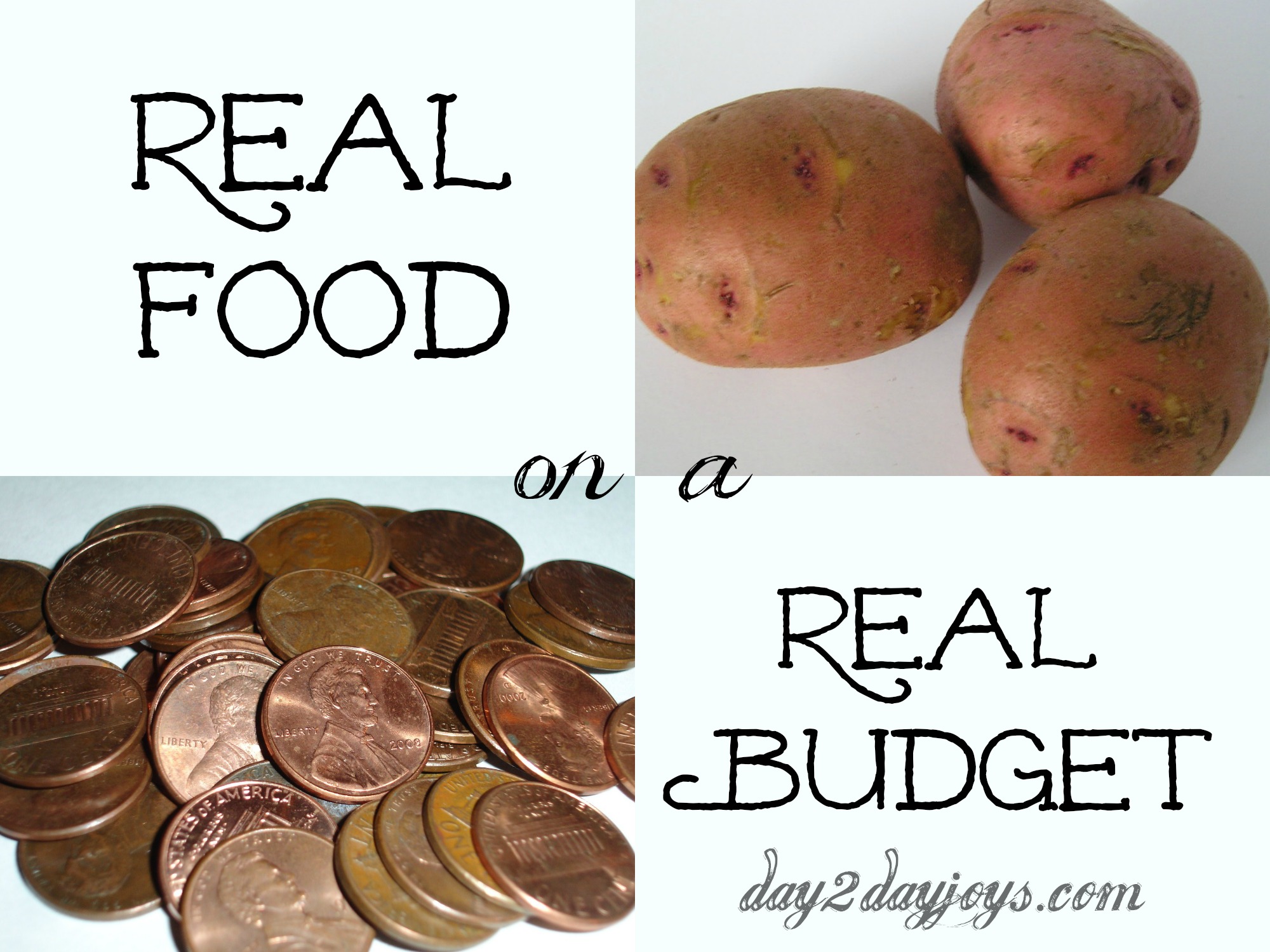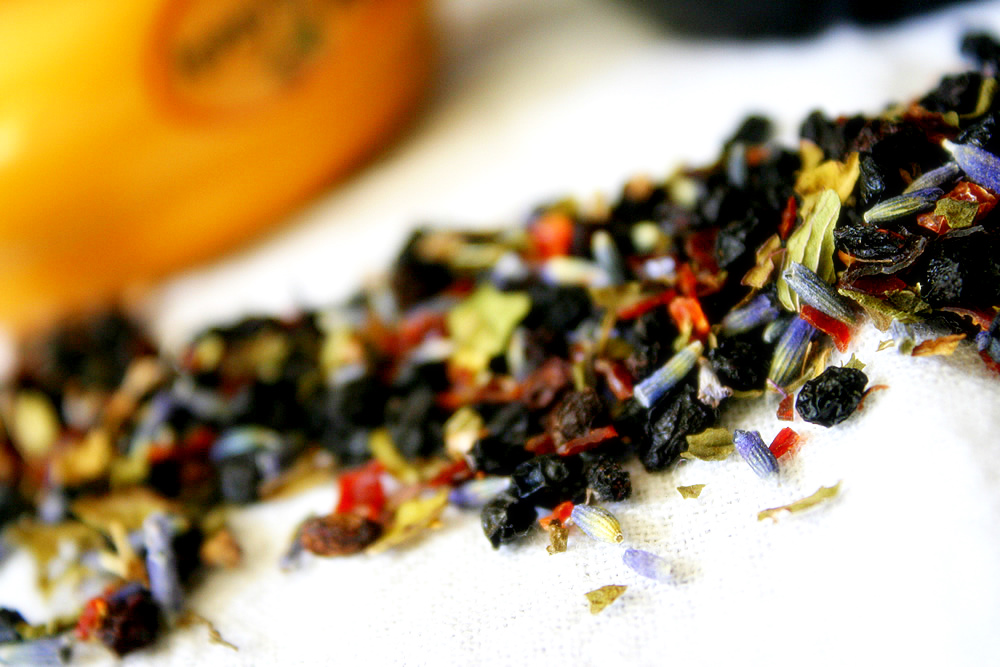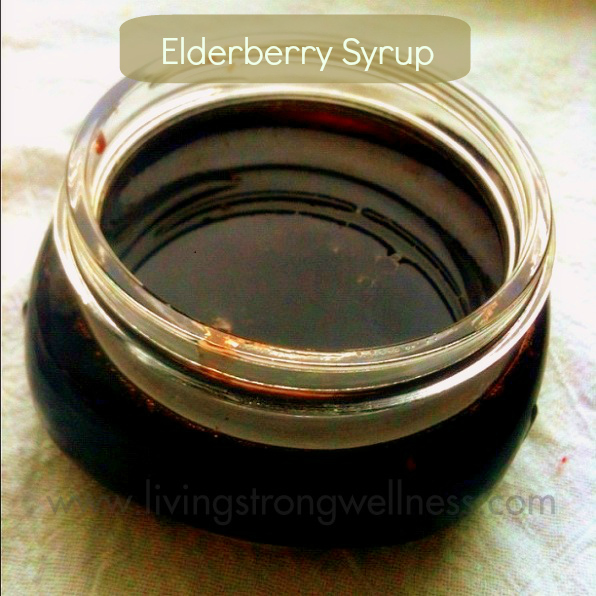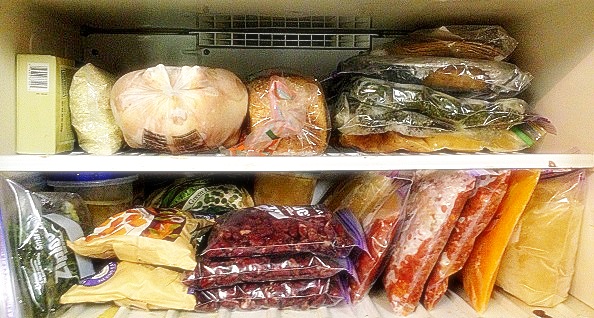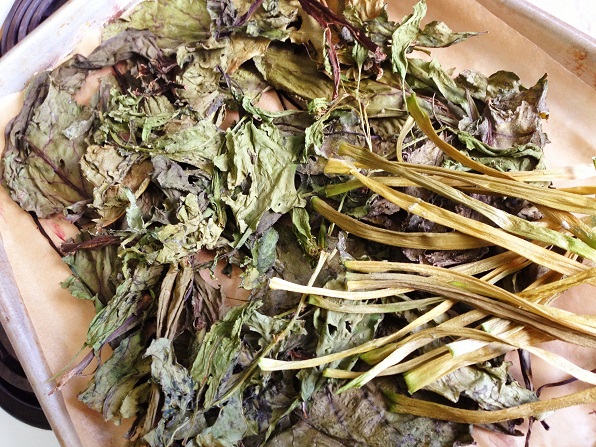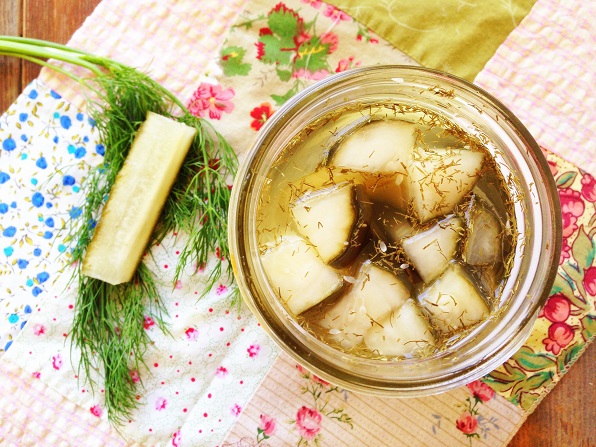The post What It’s Like to Afford Fresh Organic Produce and How You Can Do It Too appeared first on Day2Day Joys.
]]>**Please meet Reelika, a new contributor… she would love to hear from you! -Rachel
You are a great mommy. You want the best for your kids and family. It is the hope of many families to be able to provide organic veggies, fruits and berries to their family and especially to the kids. Unfortunately the downside of organic produce is the cost. But what if I told you there are ways that you can still provide the best organic produce to your kiddos without breaking your budget?
As a mom to an allergic toddler and having been diagnosed with hypothyroidism myself, I have done lots of research about the benefits of organic food. I am not a health care advisor, but I can share what has worked for our family and how you can do it too.

Organic produce has been very beneficial for our family. Since my toddler is allergic to many things, I provide him with several organic veggies, fruits and berries. He loves this delicious organic produce and is not a picky eater anymore. He used to be very hyperactive, but since switching to organic food, we don’t seem to have much of a problem with it anymore.
We cut back on other things, but invest into our health, so it keeps us away from pharmacies, doctor’s office and hospitals. Being healthy means also being more productive and happy at preschool, home and work.
Top 3 Tips on How to Afford Organic Produce
Tip # 1 – Organic Produce as an Investment
Don’t look at the price tag of the organic produce as a number; instead, see it as an investment. Compare it to the costs of medications, health care and doctor’s visits.
Chances are you have heard that non-organic food can contain pesticides and cancer-causing hormones or even GMOs. Research shows that pesticides can cause not only cancer, but also allergies, skin and neurological issues, ADHD, birth defects and much more.
Children are especially sensitive to pesticides due to their development and growth. You can either pay the farmer or the pharmaceutical business.
It is time to invest into your and your family’s health. The truth is, many people don’t think about it until they have some kind of health problem. I have to admit, I am completely guilty as I was one of them.
I never felt the need for organic food, until I was diagnosed with hypothyroidism during pregnancy. Since then I have invested into my health instead of the medications I had to use. In fact, medications were more expensive than my investment in organic produce, and I am so much healthier now.

Tip # 2 – Prioritizing Organic Produce
Take a look at what other monthly expenses you have – a new iPhone, expensive jewelry, eating out several times per week, new fancy toys, etc. If you can afford any of them, you can also afford organic produce. Find ways to cut back on monthly payments and use the money instead for quality organic produce.
I am always looking for ways to cut back on our monthly expenses. Saving water and lowering heating costs increases our grocery budget. A monthly budget gives you a crystal-clear overview of your highest expenses so you can make your own choices of where to cut back.
Tip # 3 – Making the Right Choices
It can save you big bucks if you are making the right choices. Be aware of when and which organic produce to buy.
Here is what to keep in mind while choosing fresh organic produce:
- If you bought expensive organic veggies yesterday, then find less expensive produce to buy next time you do groceries. It keeps your budget in balance.
- Meal plan and create a grocery shopping list. Buy the amount of veggies you are planning to eat so you won’t be wasteful.
- Be creative with organic veggies that are close to expiring. You can use them for smoothies, baking, or soup.
- Buy what is on sale or close to its expiry date. It can save huge bucks when the expiration date is close by. Just make sure you use it as soon as possible.
- Buy local. Any organic local veggie is always cheaper than an imported one.
- Prefer seasonal. Prioritize what is in season as it tends to be cheaper, and you can also freeze these for the non-seasonal time.
- Don’t buy pre-washed and packaged food, as these cost much more.
- Prefer healthy veggies and berries for snacks. Leaving chocolate, cookies and chips out of your grocery list saves you money for organic veggies, fruit and berries.
- Frozen organic veggies are great choices as well. Buy them in bulk and while on sale.
- Grow your own organic herbs that you can use for meals. You don’t need a yard to grow your own green leafs. All you need is a small space in kitchen or on a balcony to have your own organic herb section. I also have mini-tomatoes growing in my kitchen.
- Wash the produce just before using it so it will last longer.
- Citrus produce can last at least a week longer when stored in the fridge.
- Don’t forget coupons! Find the best deals and use them.
- Negotiate if possible. When buying directly from a farmer, use your negotiation skills. Offer to buy in bulk and don’t be afraid to ask for a discount. Most likely the farmer will be more than happy to offer you a discounted price when selling more. You can freeze the extra for later and will have saved big bucks.

Fresh organic veggies, fruits and berries are always going to be expensive, but investing into our family’s health and cutting back on our monthly expenses has made a difference for our well-being. Making the right choices keeps us on budget and provides a quality lifestyle. You can do it too!
Did I miss anything? How do you make organic produce affordable for your family?
The post What It’s Like to Afford Fresh Organic Produce and How You Can Do It Too appeared first on Day2Day Joys.
]]>The post 5 Herbs You Should Consider Growing This Year appeared first on Day2Day Joys.
]]> Written my Karen @ To Work With My Hands, Contributing Writer
Written my Karen @ To Work With My Hands, Contributing Writer
If you’ve never grown herbs before, let me encourage you to make this the year. Herbs are amazing!
There’s so many wonderful herbs to try, and it can be overwhelming when you first decide to grow them. One eager browse through an online seed catalog can have you with a loaded cart before you know it.
But, if you’re just getting started, you’ll be more successful if you keep things simple and grow just a few new herbs each year, giving yourself plenty of time to get to know each one, its growing preferences, and the many ways you can use them.
So, I’ve created a small list of just…
5 herbs you should consider growing this year:
The herbs on this list are basic, easy to grow, and practically trouble-free.
1. Basil
Basil is probably my favorite herb to grow. It’s flavor is amazing, and the uses are nearly limitless.
From the classic pesto, to adorning your homemade pizza, seasoning homemade broth, or homemade fresh herb whole wheat bread, basil is sure to become a favorite. At our house basil always makes it into a batch of homemade herb butter, and my daughter loves to gather it fresh, have me chop it for her, and add to her buttered scrambled eggs.
Basil is easy to grow and propagates readily. Because it’s an annual herb, it dies each winter. In fact, basil doesn’t do very well when temperatures drop below 50 degrees. If you choose to grow open-pollinated varieties or propagate your plants yourself, you’ll only buy seeds once! Year after year you’ll have your very own supply.
2. Parsley
Parsley is a real nutritional powerhouse – and why I always try to keep in in my garden. It’s virtually loaded with vitamin K, and an excellent source of vitamin C.
Although it’s an easy-care herb, parsley does take some patience when you start from seed. It can take between 5 and 8 weeks to germinate. There’s a very good reason for this though: parsley is a biennial herb.
Biennial plants are the middle ground between annuals – which must be regrown each year, and perennials – which live for many years. Biennials are unique in that they have a two-year life cycle.
During the first growing season, parsley produces masses of useful foliage, and during the second year it bolts, flowers, and produces seeds before dying. You can keep a steady parsley supply by starting new plants each year.
Parsley is a wonderful herb to adorn fresh spring potatoes, and is a healthy and delicious addition to soups and stews. You can choose from the flat-leaf Italian parsley, or the popular curly leaf that’s common as a garnish.
In addition to its culinary uses, parsley can become a key player for a fun science project. Watch your plants closely. If you happen to notice a hungry caterpillar munching your parsley, it has likely become the host for the swallowtail butterfly larvae.
I remember fondly the summer my oldest boys were still young and discovered one of these caterpillars on our parsley. We picked some strong stems, brought them indoors, and put them into a large glass jar, along with the caterpillar.
We kept it supplied with plenty of fresh parsley until one morning we found it all bound up in a chrysalis.
A few weeks later, the boys watched in wonder as the butterfly struggled to free itself from the chrysalis and practice opening its gorgeous wings. Later than morning we released it outdoors, and the boys enjoyed watching their very own butterfly fly away.
3. Rosemary
Rosemary is such a wonderful herb. The sharp, full flavor is perfect for flavoring meats and marinades. Once the needles are stripped, you can use the stems as skewers for grilling meat and vegetable kabobs. One of my very favorite ways to use it is in a homemade infused olive oil.
Rosemary is a perennial herb, so once it’s established, you can enjoy it for many years. Unpruned rosemary can grow up to six feet tall in zones 8 and higher, but you can still enjoy it’s beauty if you live in a cooler zone by growing it in a pot and moving it indoors during winter.
Rosemary makes a wonderful hair tonic to strengthen, soften, and encourage growth. Simply brew a few springs in water, allow to steep, then transfer to a spray bottle and use as a leave-in conditioner.
Although there are many ways to use rosemary, I also simply admire it’s beauty as a gorgeous and stately addition to the herb garden.
4. Oregano
I’ve lost track of just how many years I’ve had my oregano plant. This easy-care perennial is truly a no-fuss herb, hardy in zones 5-9. Oregano prefers well-drained soil and doesn’t need to be fertilized.
Because it tends to trail and root where stems touch the ground, I like to grow it in a large pot all year long, with trailing vines spilling over the sides. The trailing vines are perfect for cuttings to bring into the kitchen. In cooler zones it can be cut back to the ground and mulched before winter for new growth the following spring.
I nearly always pair oregano with basil for topping pizza, making herb butter, and in homemade pasta sauce. It’s also a great addition to egg dishes, pasta salad, and homemade herbal vinegars.
5. Thyme
I love the tiny, delicate leaves and flowers of thyme almost as much as I love to rub my fingers across the stems and release the fragrant aroma.
This woody perennial has been a favorite in my herb garden for as long as I’ve grown it. The blooms attract pollinating bees to the garden, and it’s Mediterranean habit, which prefers a somewhat dry and sunny location with little fertility in the soil, makes it easy to grow – regardless of your soil. It will grow in richer soil, but won’t be as fragrant.
Thyme blends well with basil, oregano, garlic, and other Mediterranean flavors such as olive oil and tomatoes. You can easily zip the tiny leaves off the stems by holding the end of the the stem tightly between your thumb and finger, then running the thumb and finger of the other hand down the stem from top to bottom. Once you have enough thyme, simply chop with a large knife – no stems!
There’s a lot more to know about these herbs, but I hope you’re inspired now get to know them yourself. They’re all wonderful and perfect for starting an herb bed. Pick two or three that appeal to you and give them a try in your garden this year! You can also dry these herbs for long-keeping.
Do you grow herbs? What are your favorites? What would you like to grow this year?
The post 5 Herbs You Should Consider Growing This Year appeared first on Day2Day Joys.
]]>The post Immune Strengthening Herbal Tea Blend appeared first on Day2Day Joys.
]]>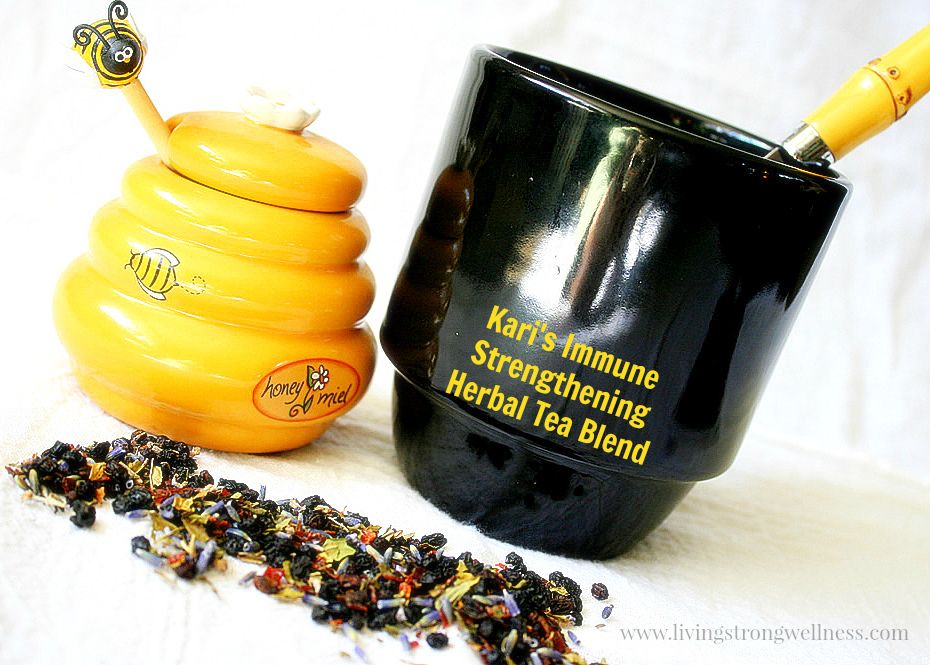
Written by Contributing Writer, Kari @ Living Strong Wellness
Now that summer break is winding down and kids are heading back to school – we need to start becoming more proactive with our children’s health.
Don’t get me wrong, we should be proactive year round, but during the summer we’re outside more getting fresh air, we’re getting loaded with Vitamin D, getting more sleep and getting more exercise. With school back in session, our children are sitting in air conditioned schools, windows closed, anti-bacterial soap flowing down the halls, little outside time, little exercise and lots of germs.
Germs…
That one word freaks a lot of people out. This is why anti-bacterial soap is a multi-million dollar business. Think about it, though…if it really worked, why are schools filled with scores of sick kids and teachers all the time? I’m not an advocate of this ‘miracle’ germ cure. Not only does it kill bad bacteria – but it kills good bacteria as well, making you and your children more susceptible to germs, viruses and infections.
I’m also not a fan of the toxic ingredient, Triclosan, in the majority of these anti-bacterial soaps. Good ole hand soap and water works just fine. In fact, my son and daughter opt out of using anti-bacterial soap at school. They have been informed the past 4 years that they are to only use soap and water. They literally stand at the door as kids come in from recess and squirt that dangerous and hormone disrupting junk on the students hands. Not good.
It’s not bad hygiene that’s an issue (although it may contribute to some children’s constant sickness). It’s the internal health of the person. This is what will determine if sickness occurs or not.
Plain and simple: we need to boost the immune systems of our children and ourselves as we get back into the school routine.
We will all be surrounded by more germs, viruses and infections and our bodies will need the extra boost to keep the immune system strong and ready to fight any foreign invaders that enter the body!
There are many ways we can aid our immune system in remaining strong throughout the year, especially the school year and winter season. I don’t know about you, but I would much rather be proactive, daily taking care of my body and my child’s body to keep sickness from taking root, than having to do all I can to bring health back where sickness came in and took over.
This recipe is easy, quick and yields approximately 12 full strength servings (adults) and 24 half strength/diluted servings (children). I am fortunate to be able to purchase all these herbs in bulk at our local Vitamin Cottage/Natural Grocers. If you are not able to purchase these locally, you can purchase them online at places such as Bulk Herb Store and Mountain Rose Herbs! If you aren’t into making teas yourself and don’t want to order bulk herbs – you can also order the herbal tea blend from my Etsy shop – Glowing Mama. Each bag contains 12 adult servings or 24 youth servings. Each serving is 1 tablespoon of the herbal tea blend to 8 ounces of water.
It’s a great addition to your daily routine to help keep the immune system strong and functioning at optimum levels! This blend can be served hot or iced. It is always best to get organically grown herbs when buying in bulk, but if it’s not possible, get what is available to you. When ordering from Mountain Rose Herbs, you will be getting high quality, organic dried herbs that you can use safely and without worry of toxins. The other option is to grow what you can as well! That’s always an added plus and you know exactly how it is grown from seed to completion.
Kari’s Immune Strengthening Herbal Tea Blend
Here’s What You’ll Need:
- 3 tablespoons dried Elderberries
- 3 tablespoons dried Rosehips
- 3 tablespoons dried Peppermint (use in adult blends) or 3 tablespoons dried Catnip (for children blends)
- 4 teaspoons dried Lavender
- 2 teaspoons dried Sage
- 2 teaspoons dried Hibiscus
- 1 teaspoon dried cut Ginger
- 1/2 teaspoon dried Thyme
Here’s What You’ll Do:
- Thoroughly combine all herbs in a large jar or large bowl.
- Store in a sealed container (glass is best), but a sealed bag or other container will work.
- Keep in a dark, cool place – such as the pantry.
- To use, in a glass jar steep 1 tablespoon of herbal blend in 8 ounces of boiling, filtered water. For a tea, steep for anywhere from 3-8 minutes. For a stronger more potent beverage, you can make an infusion by steeping for around 20-30 minutes. You can place loose herbs in a muslin tea bag, tea ball or leave them loose in the jar.
- When steeping is done, remove bag, ball or strain the herbs using a find mesh strainer.
- Add RAW honey to sweeten and enjoy! ***
*** Adults can drink this directly after steeping. If making for children 12 and under, fill cup half way with tea/infusion, then add RAW honey, then add water to fill the rest of the cup.
What do you add to your daily routine to help keep your immune system strong and thriving?
The post Immune Strengthening Herbal Tea Blend appeared first on Day2Day Joys.
]]>The post Create Your Own Health Arsenal: Build A Strong Immune System & Treat Symptoms Naturally appeared first on Day2Day Joys.
]]>
Written by Kari, Contributing Writer
This is a transitional time of year for almost everybody out there. School has started up again, summer is almost over and the cooler months are on the way. All of this means that we are going to have to pay more attention to keeping our immune systems strong so those ever present germs and bugs don’t have a chance to wreak havoc inside our bodies!
Even healthy families and houses can experience the sniffles, coughing and that ‘yucky’ feeling, but do we have to resort to the Cold/Flu aisle at the local grocery store to get us through these times?
Absolutely not!
I can’t tell you the last time I bought OTC medication for my family when those runny noses, sore throats and coughing made an appearance. I made a decision eight years ago, after my daughter was born, to take care of these issues in a better and more safe way. First and foremost my husband and I pray over our children and ourselves and speak healing scriptures over us. That is always our main defense – then we attack the natural symptoms in the body so we don’t have to just ‘wait it out’. We usually get things nipped in the bud quickly and these symptoms never go longer than a day or two.
Often times adults and children alike have weakened immune systems due to a myriad of reasons, including antibiotic use, poor nutrition, lack of activity and exercise and stress – just to name a few. Along with addressing these issues, there are several things that are in my go-to ‘health arsenal’ that are natural and safe and I feel comfortable in giving my family knowing they are beneficial to our bodies and not harmful or toxic.
How To Keep Your Immune System Strong and Treat Symptoms Naturally
1. A healthy diet
This is extremely important. If your body isn’t getting nutritious food that support the functioning of the body, your natural immune defenses will be down and this makes it so much easier for germs, viruses and bacteria to enter in and take root. So, eliminating or decreasing processed foods, eating fresh and living foods, drinking plenty of water and eating a good variety of macronutrients (healthy carbs, healthy fats and protein) is a sure way to keep the immune system strong. We also like to make our own ‘Spa Water’ around here that livens things up a bit while adding some healthy goodness to our water intake.
2. Vitamin D
When sunshine decreases in your area and you’re not spending as much time under those beautiful rays – then supplementing with Vitamin D3 is a must. Now, D3 is a fat soluble vitamin and is better assimilated by the body when taken with a fat. This is why it’s best to take Vitamin D3 with Cod Liver Oil (which contains concentrated vitamin D, vitamin A and is the #1 source of EPA and DHA). As an added note – we also lay off the sunscreen for the most part. Unless we’ll be outside in 100 degree weather for hours on end – we don’t use sunscreen. We welcome the healthy sun to do it’s job and give us natural Vitamin D! Instead we just use coconut oil or a special oil blend I make specifically for time in the sun.
3. Probiotics
The health of your gut can determine your overall health. It’s important to keep our gut populated with good bacteria and eating probiotic-rich foods is the best option. Full-fat yogurt, dairy kefir, coconut kefir, amasai, summer sun pickles, water kefir, kombucha, kimichi and beet kvass are good examples of cultured food alive with good bacteria. If needed, supplementing with a high quality probiotic is the next best option.
4. Herbs
Used since the beginning of time, herbs are amazing and there are so many things you can make with them that strengthen your immune system or attack the bad invaders if they’ve already settled in. A few of my favorite recipes that we use all the time are Elderberry Syrup, Safe Cough Syrup, Natural Remedy for Sore Throats and Immune Strengthening Herbal Tea Blend. I also like to incorporate essential oils for even better results. Even simply combining eucalyptus, rosemary and lavender essential oils with some almond oil makes a good rub when you have congestion and a stuffy nose.
5. Juicing
I am a huge advocate of juicing and for many reasons. I have experienced nothing but positive results with my family ever since we began juicing 5 years ago. Regular juicing removes toxins, cleanses on a cellular level and gives your digestive system a break! If you need to treat symptoms you see coming on – add ginger, garlic, beets, parsley or wheatgrass! Here are some of my day to day recipes we like in our house.
Choosing to make our own products has not only saved us a lot of money, but I also believe it has saved our bodies from untold amounts of damage. I have always valued the remedies of years gone by that were used by old-time grandmothers from the farm, civilizations that only had the substance of the earth to rely on and just good old common sense!
There’s no reason to fall prey to these transitional symptoms that try to show up this time of year. Start with a solid foundation of a good diet and include the other beneficial goodies as a way to keep your immune system strong and to treat symptoms naturally!
Take charge with your family’s health and make a quality decision to only take care of them using safe and natural methods! Doing this is a long term investment that pays off with long and healthy lives!
Make yours a LIFE WORTH LIVING and be confident in the fact that it is possible when you realize the reality of HEALTH MADE EASY!
Some good points to remember:
1. Just because something is ‘natural’ doesn’t mean it’s safe for everyone. Make sure you are able to consume the herbs you want to use, especially if you are pregnant, nursing, have high blood pressure or are on blood thinners. 2. Natural remedies typically go to the root of the problem to take care of the issue, so you need patience. Most OTC medications just cover up the symptoms so you feel ‘relief’ faster. What happens, though, is the issue lasts longer than it should since you never get to the root of the problem. So, don’t give up!In what ways are you creating your families health arsenal?
*this post is linked to: Encourage One Another, Titus 2sdays, and WFMW*
The post Create Your Own Health Arsenal: Build A Strong Immune System & Treat Symptoms Naturally appeared first on Day2Day Joys.
]]>The post 3 Simple Methods to Save Money and Stop Wasting Food appeared first on Day2Day Joys.
]]>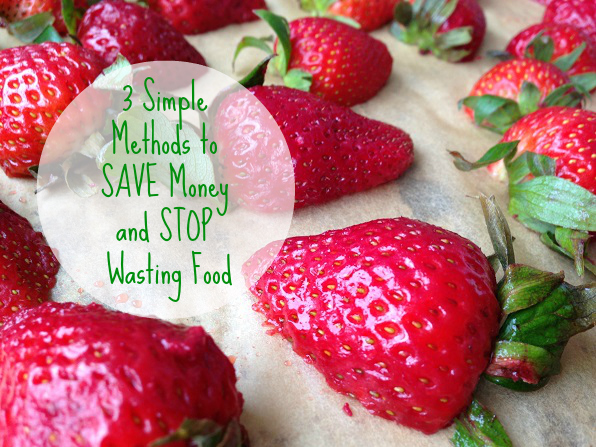
Written by Kari, Contributing Writer
Do you cringe when it comes to wasting food? I certainly do and it seems that in our society it’s not looked down upon like it used to be. There was a time when the only food a family had was what they grew on their land. Maybe small towns had a quaint little corner store that sold some food items – but they weren’t like our Walmart Supercenters or Krogers.
People valued food and I think we’ve lost that in this day and age of abundance, prepackaged foods and laboratory made foods available on every corner in America (think Doritos, Little Debbies, Captain Crunch and Slurpees).
So how can we be good stewards of the provision we have been given when it comes to food? What steps can we take to make our food supply last longer? Even if you don’t have a harvest from a garden, you can take these simple methods and use them when you are buying food from the farmers market or grocery store.
The three simple ways I save money and stop food waste in our home are:
1. Freezing
2. Deyhdrating or Drying
3. Fermenting
Now before you stop reading this thinking this is only for homesteaders – know that this is for everyone! I don’t live on land, own cattle or have a farm. I live in the suburbs with an 8’x12′ garden, a summer farmer’s market up the street and a wonderful health food store near us where they only sell organic produce, YET I employ all these sources in keeping my shelves stocked with amazing food year round.
Let’s take a look at each of these individually…
FREEZING
Whether you are harvesting a great yield from your garden or seasonal fruit and vegetables are priced great at the store, take this opportunity to freeze portions of these for use later in the season. Buy more than you’ll need, then freeze the rest. This is also great to do with vegetables, homemade sauces, beans and meat.
Buying meat when prices are good and freezing it (freezing times vary with type of meat) can save some money down the road when prices raise due to seasonal/weather changes or unexpected issues, like drought. Doing a quick search on the internet on instructions for freezing specific foods will provide many resources and instructions on how to successfully achieve this wonderful preservation method.
– To freeze fruit, wash and allow them to dry thoroughly. Lay them out in a single layer on a lined baking sheet. Stick this in the freezer until they are frozen, then transfer to a freezer bag or container. – To freeze veggies, it’s more of a process and you’ll need to blanch and chill them before freezing. – Blend up smoothies or juice fruits and veggies, then freeze them in ice cube trays, then transfer them to freezer bags or containers to use in smoothies at a later time. – Pre-make sauces, soups, stock and beans and freeze to use in the cooler months. – Keep all your veggie scraps when making other dishes, freeze them and use them to make vegetable stock. – Save bones from whole fryer chickens to make bone broth.
The possibilities are endless! Just make sure you have a good system in your freezer to store all these items. I find that freezing in freezer bags and laying them flat offers up the most space saving option.
DEHYDRATING OR DRYING
This method is great for all your greens, herbs, some veggies and even fruit. When you only need 2 tablespoons of fresh cilantro, you still have to buy it as a ‘bunch’, so you’re left with extra. Instead of letting it go bad, throwing it out or even composting it (although, once it’s gone bad – this is the best option) – dry or dehydrate the leftovers for your own dried herbs.
Oftentimes I hang my herbs to dry in a cool dark place, then grind them down and store in a glass container. When you buy or grow items like kale, chard, lettuce, spinach, etc., these are great to dehydrate and to process them into a green powder (including stems and leaves). Add these to soups or make your own green powder blend to drink – you’ll get amazing nutritional benefits from these concentrated powders.
If you don’t have a dehydrator, this can easily be done in the oven or even out in the summer sun. When using an oven, choose the lowest setting (150 on older models, 170 on newer) and heat with door shut for 2 hours. At that time, open the oven door slightly for ventilation and allow to continue heating until items are thoroughly dried. During the summer, this is best done in the evening hours so you don’t heat up the house.
Other foods you can dehydrate are nuts and seeds, which allows for an extended shelf life along with making them healthier and easier to digest. Favorites in my house are homemade trail mix, dehydrated cinnamon apple slices and sweet potato chips with sea salt. I’ve also made raw cookies using a dehydrator and they were amazing!
FERMENTING
This is such a wonderful preservation method that has been used for centuries and truly offers amazingly healthy foods! We typically think of pickles and sauerkraut, but you can ferment foods such as eggs, cabbage, beets, watermelon, dairy and meat.
There are many wonderful websites out there that will walk you through fermenting foods and they offer delicious recipes. It’s a process of creating an environment for a chemical breakdown and change in food (typically lactic-acid and alcohol fermentation).
A couple favorites at our house are my Summer Sun Pickles, Homemade Cream Cheese, DIY Crème Fraiche and Homemade Yogurt and Dairy Kefir. Make sure you don’t get sidetracked by all those articles that say fermented foods are harmful. This method to preserve food has been around since the beginning of time and research shows that those cultures who used this method (and those that still use this method) are some of the healthiest people on the earth. Refrigerators and stoves are relatively new.
Microwaves are babies in the age of kitchen appliances – so we have to realize that cultures had to prepare and preserve food in ways that didn’t require modern technology. These methods proved to be nutritionally beneficial and insured there was no waste to their provision. Remember they didn’t have Walmart down the street to go stock up on food! I love gleaning from past generation’s wisdom when it comes to food since they were a whole lot healthier then we are in 2013!
These are just three simple and easy methods that will save you money on your grocery bill and keep your pantry, freezer and refrigerator full during fresh food’s off-season! It will feel amazing to be a good steward of your money and food and not to mention that you’ll be feeding your family nutrient dense foods for optimum health!
What is your favorite way to preserve and extend the life of your abundance of food?
The post 3 Simple Methods to Save Money and Stop Wasting Food appeared first on Day2Day Joys.
]]>